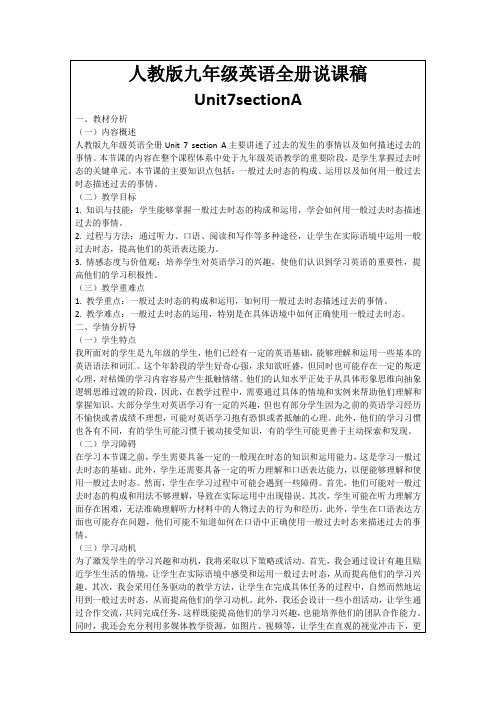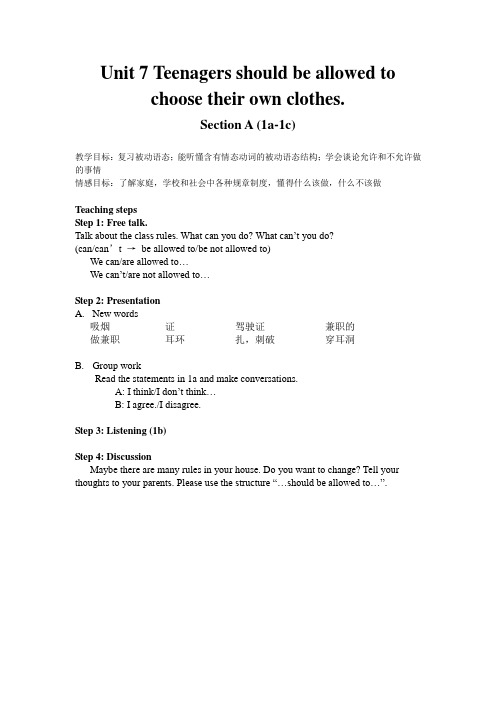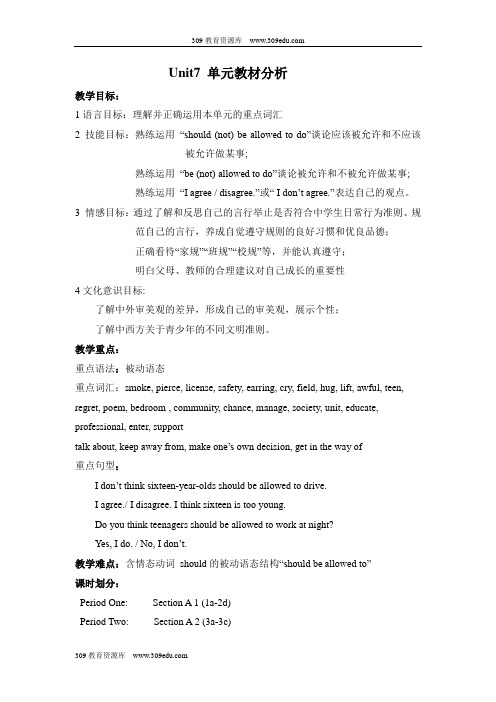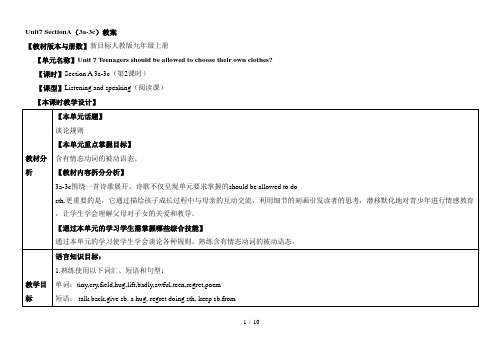人教版九年级英语全册教师用书:Unit 7
人教版九年级英语全册unit7 3a 说课稿设计

1.Teach our Ss learn to understand their parents and communicate better with their parents.
First , status and function
This is a reading passage, the topic is mom knows me best. The topic is related to our life and our love for our mothers. So it can arouse students’ interests. It is also a poem, so it has
MomKnows Best
Designedby
Hello, everyone,
Today I’m very pleased to have an opportunity to talk about some of my teaching ideas. My topic isMom Knows Best.It is made up of five parts.
1.Analysisof teaching materials
2.Analysisofstudents
3.The teaching methods
4. The learning methods
5. The procedures of the teaching
Part 1 The analysis of the teaching material:
人教版九年级英语全册说课稿Unit7sectionA

(一)导入新课
为了快速吸引学生的注意力和兴趣,我计划采用故事导入的方式。在上课伊始,我会讲述一个发生在过去的故事,并引导学生猜测故事中发生了哪些事情。通过这种方式,我可以激发学生的好奇心,让他们主动参与到课堂中来。随后,我会揭示这个故事就是今天我们要学习的内容,从而自然地引入到一般过去时态的学习。
(二)新知讲授
在新知讲授阶段,我会采取逐步呈现知识点的方式。首先,我会通过展示一些图片和视频资料,让学生直观地感受到过去时态的应用场景。接着,我会用简单的语言解释一般过去时态的构成和用法,并通过具体的例句来展示一般过去时态的运用。在讲解过程中,我会鼓励学生积极参与,提问和回答问题,从而加深他们对一般过去时态的理解。
(三)教学重难点
1.教学重点:一般过去时态的构成和运用,如何用一般过去时态描述过去的事情。
2.教学难点:一般过去时态的运用,特别是在具体语境中如何正确使用一般过去时态。
二面对的学生是九年级的学生,他们已经有一定的英语基础,能够理解和运用一些基本的英语语法和词汇。这个年龄段的学生好奇心强,求知欲旺盛,但同时也可能存在一定的叛逆心理,对枯燥的学习内容容易产生抵触情绪。他们的认知水平正处于从具体形象思维向抽象逻辑思维过渡的阶段,因此,在教学过程中,需要通过具体的情境和实例来帮助他们理解和掌握知识。大部分学生对英语学习有一定的兴趣,但也有部分学生因为之前的英语学习经历不愉快或者成绩不理想,可能对英语学习抱有恐惧或者抵触的心理。此外,他们的学习习惯也各有不同,有的学生可能习惯于被动接受知识,有的学生可能更善于主动探索和发现。
(二)媒体资源
为了辅助教学,我将使用多媒体课件、视频材料以及电子白板等教学工具。多媒体课件和视频材料能够提供丰富的视觉信息,帮助学生更好地理解和记忆所学内容。电子白板则可以用于展示和解释一些复杂的语言点,也可以用于组织学生进行互动活动。这些媒体资源在教学中的作用是,它们能够提供生动、直观的学习材料,激发学生的学习兴趣,也有助于提高学生的学习效果。
英语人教版九年级全册Unit7《Mom knows best》教学设计

英语人教版九年级全册Unit7《Momknows best》教学设计Step 1: Lead-inGood morning。
Grade 9 (85)。
Today。
we will be studying Unit 7 n A of the New Standard English textbook。
The main focus will be on the poem "Mom Knows Best." Through us activities。
we will learn to appreciate the XXX.Step 2: Understanding the XXXOur learning objectives for this class are:1.XXX.2.To learn to read the poem with XXX.3.XXX.Step 3: XXXIn this lesson。
we will focus on the following:1.XXX.2.XXX.3.Reflecting on our own family XXX.Step 4: XXXXXX and a video clip from the movie "Brave" to help us XXX.Step 5: Lead-in ActivityLet's start the class by discussing the two key words fortoday's lesson: "poem" and "mom." Do you love your mom。
How do you deal with disagreements with your parents。
Let's share our ns.Step 6: Watch and Learn (Part 1)Now。
英语人教版九年级全册9年级Unit7

Unit 7 Teenagers should be allowed tochoose their own clothes.Section A (1a-1c)教学目标:复习被动语态;能听懂含有情态动词的被动语态结构;学会谈论允许和不允许做的事情情感目标:了解家庭,学校和社会中各种规章制度,懂得什么该做,什么不该做Teaching stepsStep 1: Free talk.Talk about the class rules. What can you do? What can’t yo u do?(can/can’t →be allowed to/be not allowed to)We can/are allowed to…We can’t/are not allowed to…Step 2: PresentationA. New words吸烟________ 证________ 驾驶证________ 兼职的________做兼职________ 耳环________ 扎,刺破________ 穿耳洞________B. Group workRead the statements in 1a and make conversations.A: I think/I don’t think…B: I agree./I disagree.Step 3: Listening (1b)Step 4: DiscussionMaybe there are many rules in your house. Do you want to change? Tell your thoughts to your parents. Please use the structure “…should be allowed to…”._____________________________________________________________________ _____________________________________________________________________ _____________________________________________________________________ _____________________________________________________________________ _____________________________________________________________________Step 5: Exercises1. The classroom should ______ every day.A. cleanedB. cleanC. be cleaned2. The students shouldn’t ______ to go to an Internet bar.A. allowsB. be allowedC. allowed3. -I think students should wear school uniforms.-______. We should be allowed to wear our own clothes.A. I disagree.B. I think so.C. I agree.4. -Dirty water shouldn’t be poured into the rivers.-______. It will cause pollution.A. I agree with you.B. I disagree.C. Never mind.5. My bike was broken. Tomorrow I will get my bike ______.A. repairB. repairedC. repairing6. ______ shouldn’t be allowed to stay out late.A. Fifteen-years-oldB. Fifteen-year-oldC. Fifteen-year-olds7. Many parents don’t allow their children to get their ears picered.(英译中)______________________________________________8. Teenagers should be allowed to have part-time jobs.(英译中)______________________________________________9. 这些旧规则应该被改变。
Unit7SectionA(3a3b)教学设计人教版九年级英语全册

设计说明:
1.理念:基于课程标准,追求目标—教学—评价的一致性,以评价驱动教学,有效落实国家课程、实现有效教学。
2.内涵:1)既定教学目标、课中学习目标及评估目标三者内容上的同一性2)教学目标、学习方法、评估工具三者本质上的同一性
3.基本程序与原则:以“教学效益”为纬线,“教师的教学哲学、智慧与能力”为经线,遵循教学评的一致性,处理好三个程序:
制定学习目标(回答:什么最值得学习)——设计课堂评价(回答:如何证明实现了目标)——选择教学策略(回答:怎样安排教学活动帮助达标)
4.构成:包括四部分:(一)学习目标的设置(二)评价任务的设计(三)教学设计(四)作业/拓展设计。
5.操作方法:
首先,确立清晰的学科目标体系。
依据制定目标的三个依据:课标在哪里?——回答:学生需要学什么?文本在哪里?——回答:学什么最有价值?学生在哪里?——回答:学生学习的起点是什么?通过一系列的目标具体化技术,制定出准确、清晰、可测量的学习目标。
其次,设计基于目标的评价任务。
明确目标之后,教师就应该设想“我用什么样的检测工具可以检测学生目标达成的程度”,了解学生已经学习到了什么,离预设的目标还有多远,以便于自己。
英语人教版九年级全册Unit7教学设计

英语人教版九年级全册Unit7教学设计
Unit 7 Teenagers should be allowed to choose their own clothes. Section A(1a-1c)
1.教学方法和目标:通过集体讨论的形式,谈论一下学校制度或家庭制度,以练习“允许做某事”(allow somebody to do something )“应该被允许做某事”(should be allowed to do something )的用法。
2.情感态度与价值观目标:通过对学校或其他制度的讨论,培养学生自我判断是非的能力,作为学生什么该做、什么不该做,要做到心中有数,同时针对一些社会的不良现象,也应该有极强的判断力和正义感。
3.能力目标:能正确使用情态动词和含有情态动词的被动语态(should be allowed to do something )结构表达自己对事情的看法和观点。
4.探究活动(任务):结合班上的实际情况,分小组分别讨论,编写一份行之有效的、受同学们欢迎和认可的班级规章制度,并与其他小组进行比较和修改,最后将之作为正式的班规张贴起来。
人教版英语九年级全册Unit7SectionA1a2d教学设计

c.通过讲解、示例、练习等多种方式,帮助学生掌握一般现在时态和现在进行时态的用法,以及词汇和短语的运用。
2.创设互动、轻松的课堂氛围,鼓励学生积极参与课堂活动,提高学生的学习兴趣。
a.教师应以鼓励为主,关注学生的进步,及时给予正面反馈。
3.观看一部英语家庭题材的电影或电视剧片段,记录下至少5个场景中出现的家庭成员行为和习惯,并运用一般现在时态和现在进行时态进行描述。
a.鼓励学生关注日常生活中的英语表达,提高学生的听力水平。
b.教师可推荐一些适合的影片或电视剧,帮助学生更好地完成作业。
4.家庭作业:与家人进行一次关于家庭和谐、相互尊重的交流,并以日记形式记录下交流过程和感受。
三、教学重难点和教学设想
(一)教学重难点
1.重点:本节课的重点在于掌握一般现在时态和现在进行时态的用法,以及能够运用所学词汇和短语进行家庭成员行为和习惯的描述。
难点:学生在实际对话中灵活运用这两种时态,以及正确使用新学的词汇和短语。
2.重点:提高学生的听力理解能力和口语表达能力,特别是在家庭场景中的实际应用。
人教版英语九年级全册Unit7SectionA1a2d教学设计
一、教学目标
(一)知识与技能
1.能够准确理解和运用本节课所学的生词和短语,如"teenager"、"argue"、"ignore"、"permission"等,并能运用到日常对话中。
2.能够理解和运用一般现在时态和现在进行时态描述家庭成员的行为和习惯。
(三)学生小组讨论
1.教师将学生分成若干小组,每组讨论以下问题:“How do you use the simple present tense and the present continuous tense to describe your family members' behavior and habits? Can you give some examples?”
人教版英语九年级全册Unit7 单元教材分析

重点语法:被动语态
重点词汇:smoke, pierce,license, safety, earring, cry, field, hug, lift, awful, teen, regret, poem, bedroom , community,chance, manage, society, unit, educate, professional, enter, support
talk about, keep away from, make one’s own decision, get in the way of
重点句型:
I don’t think sixteen-year-olds should be allowed to drive.
I agree./ I disagree. I think sixteen is too young.
Do you think teenagers should be allowed to work at night?
Yes, I do. / No, I don’t.
教学难点:含情态动词should的被动语态结构“should be allowed to”
课时划分:
Period One: Section A1 (1a-2d)
3情感目标:通过了解和反思自己的言行举止是否符合中学生日常行为准则、规范自己的言行,养成自觉遵守规则的良好习惯和优ቤተ መጻሕፍቲ ባይዱ品德;
正确看待“家规”“班规”“校规”等,并能认真遵守;
明白父母、教师的合理建议对自己成长的重要性
4文化意识目标:
了解中外审美观的差异,形成自己的审美观,展示个性;
了解中西方关于青少年的不同文明准则。
九年级英语人教版全册 Unit7_SectionA(1a-2d)名师教案

T: Do you think you should be allowed to watch TV on school nights?(教授should be allowed to)
S1: Yes. I think students should be allowed to watch Tv on school nights.
【本课时教学设计】
教材分析
【本单元话题】
谈论规则
【本单元重点掌握目标】
含有情态动词的被动语态。
【教材内容拆分分析】
1a-1c通过及听力活动导入本单元话题:哪些事情是允许青少年做的,哪些是不允许做的。其中1a的单元主题图展现了一对母女对话的场面以及她们讨论的内容,少年开车,挑选自己喜欢的衣服,穿耳洞戴耳环,女儿询问母亲是否能做朋友的车。1a还呈现了本单元重点语言结构:与情态动词连用的被动语态。活动1b的对话,将本单元话题、语法和句型真实地呈现出来,训练学生在听的过程中获取信息的能力。
2:T: you have shared your opinions today we will know some rules in Anna house,read the sentences in 1b, try to understand the meanings.
1:Listen for the first time and try to circle T or F.
Answers:TFT
2: Listen for the second time and fill in the blanks.
Anna: Mom,can I go to the shopping center with John? He just got his driver’s license.
人教版九年级英语全册教师用书:Unit 7

Unit 7Teenagers should be allowed to choose their own clothes.1.I don't think sixteen-year-olds should be allowed to get their ears pierced.我认为不应该允许16岁的孩子穿耳洞。
(1)当主句的主语是第一人称I或we,谓语动词是think, believe, suppose, guess等词时,其后的从句不能是含有not的否定句;若要否定,须将not提到主句。
在翻译时,按汉语习惯翻译。
例如:“我想他不会给你打电话的”应译为I don't think he will give you a call.,而不是I think he won't give you a call.。
(2)本句中的sixteen-year-olds相当于sixteen-year-old teenagers,意为“16岁的孩子”。
数词和一个相应的名词单数用“-”连接起来,可以构成一个合成形容词。
也可以是数词、单数名词和形容词用“”连接起来作形容词。
如:a 300-meter-long river一条300米长的河流a twomonth holiday一段两个月的假期a sixtypound stone一块60磅重的石头(3)get their ears pierced属于“get/have+名词/代词+动词的过去分词”结构,意为“使……被做;请人做……”。
如:①I'll go out to get my hair cut.我要出去理发。
②Why haven't you got the work done yet?你为什么还不叫人把活干了呢?2.I regret talking back, not listening to Mom.我后悔顶嘴了,没有听妈妈的话。
人教版九年级英语全Unit7(SectionB2b2e)说课稿

3.课后写作任务:要求学生运用所学词汇和语法,写一篇关于青春期影响的小短文;
4.互评互改:学生相互批改作文,并提出修改意见,以提高写作水平。
(四)总结反馈
在总结反馈阶段,我将采取以下措施:
1.引导学生自我评价:让学生回顾本节课的学习过程,反思自己的学习方法和效果;
2.互动讨论:组织学生进行小组讨论,让他们在互动中学习,提高学习积极性;
3.激励评价:对学生的每一次进步给予肯定和鼓励,增强他们的自信心;
4.任务驱动:设计有趣的任务和活动,让学生在实践中运用所学知识,提高实际运用能力;
5.拓展延伸:引导学生关注青春期话题的社会现象,提高他们的社会责任感。
三、教学方法与手段
(一)教学策略
我将采用以下主要教学方法:任务型教学法、情境教学法和合作学习法。
1.任务型教学法:通过设计真实有趣的任务,让学生在完成过程中自然地运用目标语言,提高他们的语言实际运用能力。这种方法的理论依据是交际语言教学法,强调语言学习应注重实际交流。
2.情境教学法:通过创设与青春期相关的情境,让学生在情境中感知、体验和运用目标知识。这种方法的理论依据是认知心理学,认为情境有助于知识的意义建构。
(2)一般现在时和一般过去时的被动语态的运用;
(3)阅读理解能力的提高。
2.教学难点:
(1)新词汇和短语的理解和运用;
(2)被动语态的掌握,尤其是与主动语态的区别;
(3)阅读理解中,对文章细节的把握和推理能力的培养。
二、学情分析导
(一)学生特点
本节课面向的是九年级学生,他们正处于青春期,具有较强的好奇心和求知欲。在认知水平上,他们已经具备了一定的英语基础,能够进行简单的阅读理解和语言表达。此外,学生对与自身生活相关的话题有较高的学习兴趣,喜欢通过互动和讨论的方式进行学习。
人教版九年级全一册Unit7SectionA1a2d教学设计

-设计意图:巩固课堂所学,提高学生对英语知识的掌握程度。
2.口语练习:学生选取一个过去的事件,用一般过去时和过去进行时进行描述,并录制音频或视频,下节课分享。
-设计意图:提高学生的英语口语表达能力,培养学生的自信心。
3.写作任务:请学生以"My Past Event"为题,写一篇关于自己过去经历的短文,要求使用一般过去时和过去进行时,并尽量运用本节课所学的词汇和短语。
2.新课呈现:采用任务型教学法,结合课本中的对话和听力材料,引导学生学习和运用一般过去时和过去进行时。
-设计意图:使学生在实践中掌握英语知识,提高语言运用能力。
3.互动交流:组织学生进行小组讨论、角色扮演等活动,让学生在实际语境中运用所学知识,提高口语表达能力。
-设计意图:培养学生的合作精神和交流能力,提高英语口语水平。
二、学情分析
九年级的学生已经具备了一定的英语基础,他们对英语学习有着较高的兴趣和热情。在此基础上,他们对过去时态的掌握程度较好,但在实际运用过程中,仍存在一些困难。例如,部分学生对一般过去时和过去进行时的运用容易混淆,对一些时间状语的使用不够熟练。此外,学生在进行英语口语表达和写作时,词汇和短语的运用尚需加强。
设计意图:通过图片和问题导入,激发学生的兴趣和好奇心,为新课的学习做好铺垫。
(二)讲授新知
1.教师播放课本中的听力材料,引导学生关注动词的过去时态,并让学生回答以下问题:“What did the child do an hour ago? What was he doing when his mother called him?”
4.教师组织学生进行角色扮演活动,让学生在实际语境中运用所学知识,提高口语表达能力。
人教版英语九年级全册Unit7SectionB2bReading说课稿

在新知讲授阶段,我将逐步呈现知识点,引导学生深入理解。首先,我会介绍一些基本的环境保护词汇和表达方式,让学生掌握必要的语言工具。然后,我会通过阅读材料或讲解的方式,向学生介绍环境保护的重要性、环境问题的产生原因以及我们可以采取的行动。在这个过程中,我会使用多媒体课件和实物教具,以直观的方式展示环境保护的相关内容。同时,我会提问和引导学生进行思考,帮助他们理解和吸收新知识。
(二)媒体资源
为了辅助教学,我将使用多媒体课件、网络资源和实物教具。多媒体课件可以提供丰富的视觉和听觉信息,帮助学生更好地理解和记忆教学内容。网络资源可以提供更多的信息和案例,拓展学生的知识视野。实物教具可以直观地展示环境保护的相关物品,增强学生的感性认识。这些资源和技术工具在教学中的作用主要是激发学生的学习兴趣,提供丰富的学习资源,帮助学生更好地理解和掌握教学内容。
3.情感态度与价值观目标:通过本节课的学习,学生能够意识到环境保护的重要性,认识到自己应该承担的责任,激发学生积极参与环境保护行动的意愿。
(三)教学重难点
1.教学重点:本节课的教学重点是学生能够掌握环境保护相关词汇和表达方式,并能够运用这些词汇和表达方式进行简单交流。此外,学生还需要通过阅读和讨论,理解文章的主旨大意,获取和整理相关信息。
(二)教学目标
1.知识与技能目标:学生能够掌握本节课中涉及的环境保护相关词汇和表达方式,如“pollution”、“deforestation”等,并能够运用这些词汇和表达方式进行简单交流。
2.过程与方法目标:通过阅读和讨论,学生能够提高阅读理解能力,学会从文章中获取和整理信息,培养解决问题的能力。
(三)互动方式
为了促进学生的参与和合作,我计划设计以下师生互动和生生互动环节:首先,通过提问和回答的方式,让学生参与到课堂讨论中,激发他们的思考。其次,通过小组讨论和合作任务,让学生与他人共同解决问题,培养他们的合作精神。再次,通过角色扮演和模拟活动,让学生亲身体验环境保护的过程,提高他们的实践能力。最后,通过反馈和评价,让学生了解自己的学习情况,激发他们的学习动力。这些互动方式可以帮助学生更好地参与到学习中,提高他们的学习效果。
人教版英语九年级全一册教案:Unit7SectionA(3a-3c)

(阅读中中)
(15mins)
1.Let the class read the new words by themselves.
2.Teach the difficult words.
1:Let the class read the poem aloud and discuss what the title means .
•kept him safe when he was running through the field
•hugged him and lifted him up when he fell
2. He felt that he was growing up and he did not want to be treated like a small child anymore.
步骤
过程
措施(教师活动与学生活动)
目的
持续性评价
DELC4
1
预备与激活先期知识
Step 1
Greeting and Leading in ( 3mins )
1. Greet the class and discuss “What is your mother like?”
2. Let’s watch a video.
T: Is you mother like the mother in the song?
S:…
T: When your mother asks you to get up in the morning, what will you say?
S:…
T:When your mother asks you to do your homework right now, what will you say?
- 1、下载文档前请自行甄别文档内容的完整性,平台不提供额外的编辑、内容补充、找答案等附加服务。
- 2、"仅部分预览"的文档,不可在线预览部分如存在完整性等问题,可反馈申请退款(可完整预览的文档不适用该条件!)。
- 3、如文档侵犯您的权益,请联系客服反馈,我们会尽快为您处理(人工客服工作时间:9:00-18:30)。
Unit 7Teenagers should be allowed to choose their own clothes.1.I don't think sixteen-year-olds should be allowed to get their ears pierced.我认为不应该允许16岁的孩子穿耳洞。
(1)当主句的主语是第一人称I或we,谓语动词是think, believe, suppose, guess等词时,其后的从句不能是含有not的否定句;若要否定,须将not提到主句。
在翻译时,按汉语习惯翻译。
例如:“我想他不会给你打电话的”应译为I don't think he will give you a call.,而不是I think he won't give you a call.。
(2)本句中的sixteen-year-olds相当于sixteen-year-old teenagers,意为“16岁的孩子”。
数词和一个相应的名词单数用“-”连接起来,可以构成一个合成形容词。
也可以是数词、单数名词和形容词用“”连接起来作形容词。
如:a 300-meter-long river一条300米长的河流a twomonth holiday一段两个月的假期a sixtypound stone一块60磅重的石头(3)get their ears pierced属于“get/have+名词/代词+动词的过去分词”结构,意为“使……被做;请人做……”。
如:①I'll go out to get my hair cut.我要出去理发。
②Why haven't you got the work done yet?你为什么还不叫人把活干了呢?2.I regret talking back, not listening to Mom.我后悔顶嘴了,没有听妈妈的话。
(1)regret作动词时,过去式和过去分词都为regretted,后接名词或动名词。
常见句型有:regret to say...,regret+that从句,It is to be regretted that...。
如:①I regret being unable to help.=I regret that I can't help.我为帮不上忙而深感抱歉。
②I regret to say that I can't come today.我很抱歉今天我不能来。
③It is to be regretted that I can't go camping with you.真可惜我不能和你一起去野营。
(2)regret作名词时,既可作不可数名词,也可作可数名词。
如:①Much to my regret, I am unable to accept your kind invitation.不能接受你的盛情邀请,我深感抱歉。
②He refused with many regrets.他深感抱歉地拒绝了。
3.I know my parents care about me.我知道我父母关心我。
本句中的care about为及物动词短语,意为“关心;在乎;介意”,其后接名词或代词。
如:①The girl never cares about others.那个女孩从不关心别人。
②She didn't care about anything people might say.人们说什么她都不在乎。
1.No way!不可能/不行!这是英语口语中一个直接拒绝对方的表达用语,强调不赞同别人的观点,或根本没有可能按照其要求去做事。
如:①—Will they give you a job?他们会给你工作吗?—No way.不可能。
②There is no way for you to reach her.你没办法联系到她。
2.When I was a tiny baby crying all night, my mom sang to me and stayed by my side.当我还是一个整夜哭闹的小宝宝时,妈妈会给我唱歌,陪伴在我身旁。
这里crying all night 为现在分词短语,跟在名词baby后面作定语,修饰baby。
如:Most of the people singing are students.大多数唱着歌的人是学生。
3.①I agree.我同意。
②I disagree.我不同意。
(1)agree意为“赞成;同意”,用来表示同意某人的意见、观点等。
如:①—Shall we go to the zoo tomorrow?我们明天去动物园,好吗?—I agree.我同意。
②I quite agree with you.我完全赞成你的意见。
agree with意为“同意”,后面接表示人的名词或代词,也可以接表示意见、看法的名词。
如:①We all agree with him. 我们都同意他。
②Do you agree with my ideas?你同意我的观点吗?(2)disagree是agree的反义词,相当于not agree。
4.Only then will I have a chance to achieve my dream.只有到那时我才有机会实现我的梦想。
only处于句首,并且后面紧跟状语时,全句需要倒装。
如:①Only then did he understand it.只有到那时,他才明白。
②Only in this way can we learn English well.只有这样我们才能把英语学好。
③Only when she came home did he learn the news.当她到家时,他才得知了这消息。
被动语态(三)含有情态动词的被动语态(1)概念:含有情态动词的被动语态说明某人被动性动作所反映出的感情和态度。
在初中阶段可用于被动语态的情态动词有can, may, must, should等,分别表示“能够被……”,“可以被……”,“必须被……”,“应该被……”。
句子结构为:主语+情态动词(can, may, must, should)+be+过去分词+其他。
如:①The computer must be repaired now.电脑必须立刻被修。
②Many trees should be planted on the mountains.应该在山上种许多树。
(2)转变方法:将含有情态动词的主动句式变成被动句式,即:“情态动词+动词原形”变成“情态动词+be+过去分词”,然后再加上“by+主动句中的主语(人称代词用宾格)”。
by短语也可省略。
如:①We should allow the students to wear their own clothes at school.→The students should be allowed to wear their own clothes at school.②Can they finish the work in two weeks?→Can the work be finished in two weeks?③You must hand in your compositions after class.→Your compositions must be handed in after class.④He can write a great many letters with the computer.→A great many letters can be written with the computer by him.(3)句式变换:含情态动词的疑问句、否定句的变化均需要借助于情态动词完成。
1)一般疑问句:情态动词(Can, May, Must,Should)+主语+be+过去分词+其他,即直接将被动语态的陈述句中的情态动词提前。
如:Must this work be done at once?这项工作必须立即完成吗?2)特殊疑问句:特殊疑问词+情态动词(can, may, must, should)+主语+be+过去分词+其他,即由特殊疑问词加上被动语态的一般疑问句构成。
如:Where can the book be found?这本书在什么地方能被找到呢?3)否定句:主语+情态动词+not+be+过去分词+其他,即在情态动词后面加上not 或never即可,但must表示“必要”时否定式为needn't。
如:①This work needn't be done at once.这项工作没必要立即做。
②This problem can't be worked out very easily.这道试题不能被轻而易举地算出来。
一、完形填空Last summer, I went to visit my cousin. My dad was __1__ when my aunt called him. He left his cigarette(香烟) on a table __2__ he could continue smoking it when he came back.My cousin __3__ the cigarette to check it out. She asked me if I had ever smoked before. “No way,”I answered and threw the cigarette __4__ the ground. Just then, my dad came back and looked for his cigarette. “__5__ is my cigarette?”he asked. I knew that this was the moment of truth and began to explain.I told my dad that I couldn't believe that he would __6__ to smoke. I was sure he knew how __7__ it was, so why did he do it? He said that he started when he was a teenager. Now he was so addicted(上瘾的) that he couldn't __8__.Then I remembered a report I saw on TV. There was a lady who was so addicted tocigarettes that she'd gotten really __9__. But she still __10__ stop smoking. They had to cut a hole in her throat for her to __11__,and she was still smoking through the hole! How terrible! Standing in front of my __12__,I began to cry. What if that happened to __13__?Ever since that day, I think my dad has tried to stop smoking. I'm still telling him how much I love him and don't want to __14__ him because of smoking. I know one thing: I'll __15__ smoke.I want to live a long time. I don't want to be sick or out of control of my life.()1.A.cooking B.smoking C.sleeping D.reading()2.A.so that B.although C.but D.because()3.A.gave up B.got up C.picked up D.set up()4.A.on B.below C.under D.over()5.A.How B.What C.Which D.Where()6.A.refuse B.forget C.choose D.needed()7.A.good B.bad C.small D.cool()8.A.stop B.continue C.notice D.leave()9.A.healthy B.safe C.active D.ill()10.A.couldn't B.could C.must D.mustn't()11.A.breathe B.eat C.drink D.rest()12.A.cousin B.dad C.aunt D.mom()13.A.her B.you C.me D.him()14.A.lose B.help C.protect D.warn()ually B.sometimes C.never D.seldom二、用方框中所给词的适当形式填空safe pierce ear bad listen1.The girl got her ears pierced, but she doesn't wear ________.2.I regret not ________ to your advice so that I made a big mistake.3.These days, there are many rules for water ________.4.Rose did very ________ in the history exam, for she hadn't prepared for it well.5.Do you think sixteenyearolds should be allowed to get their ears ________?三、用所给词的适当形式填空1.Only then will I have a chance ________(achieve) my dream.2.Sixteenyearolds should not be ________(allow) to smoke.3.Children should learn to make their own ________(decide).4.He gave his ideas, but I ________(agree) with him.5.There are so many ________(choice). You should be careful to make a decision.6.When Zhu Zhiwen was working in the ________(field), he often sang for himself.7.Most of the people have bad teeth because of bad habits, like heavy ________(smoke).8.Thanks for teaching, ________(support) and helping us!9.Bus drivers have to receive strict training before getting driving ________(license).10.Shaking off the rain like a wet dog, I ________(enter) Mr.Rader's office.11.My mother ________(hug) me and cried when she sent me off at the airport.12.We will have more ________(chance) to choose a good job if we study hard now.13.He sent the old man to the hospital. Although he missed the game, he never ________(regret).14.However, in most European ________(society), it is very common for teenagers to move out.15.I know one can get educated in many ways, but universities are the best places to teach me how ________(educate) myself.四、根据中文提示完成短文Many families find it useful to write down some rules about what family members are 1________(期望) to do. Every family member should know what is or isn't allowed. The rules can be stuck(粘贴) on the fridge. In that way, younger children can have a 2________(机会) to read them.You can 3________(设法) to make simple rules as soon as your child has the language skills to understand them. Young children will need parents' 4________(支持) to follow rules. They need help to understand and remember rules. You can give your child a 5________(拥抱) if he does well.Rules are also helpful to teenagers. Instead of sticking the rules on the fridge, it's a good idea to keep them somewhere a little more 6________(私密的). For example, teenagers can stick the rules on the walls of their bedrooms.Rules about 7________(安全) are important to teenagers. Many people think teenagers shouldn't be allowed to stay out late. Besides, without a driver's 8________(证书), a teenager shouldn't drive a car. Rules about health are also very necessary. Teenagers shouldn't 9________(吸烟) or drink wine(酒). It's bad for their health. In 10________(公共的) places, teenagers shouldn't talk loudly. It's good for them to develop good behavior(行为).五、语法填空阅读下面短文,在空白处填入一个适当的词,或填入括号中所给单词的正确形式。
